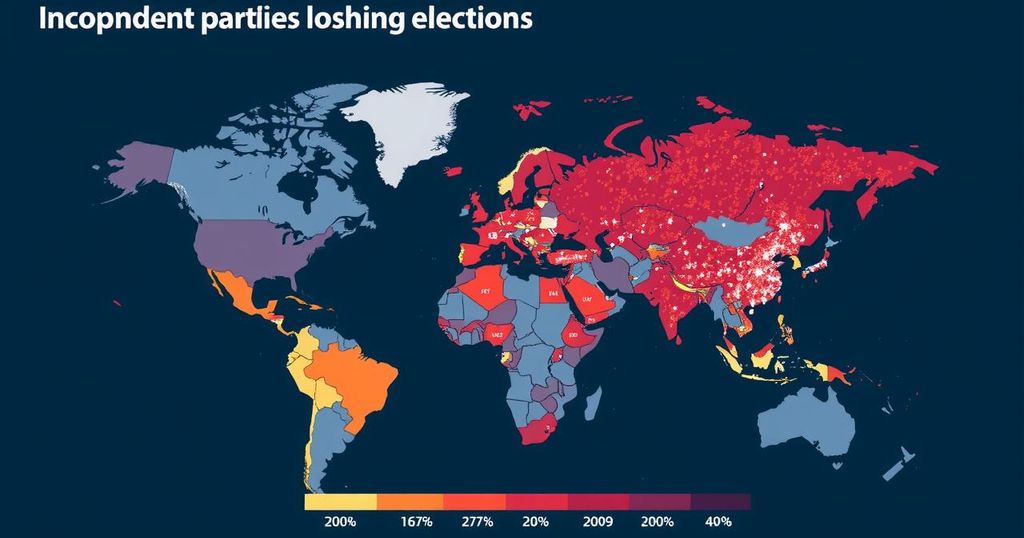Global Electoral Trends Show Democrats Aren’t Alone in Incumbent Losses

The article outlines the global trend of incumbent parties facing electoral losses, emphasizing that the Democratic Party’s performance in the U.S. reflects broader voter dissatisfaction. With over 80% of democracies experiencing setbacks, the Democrats’ relatively mild losses highlight economic factors and the importance of campaign focus. Ultimately, the Democrats may benefit from transitioning to a non-incumbent status in future elections, capitalizing on the ongoing pattern of voter discontent.
Recent electoral outcomes indicate that the Democrats are not isolated in their losses; similar trends have manifested globally, with many incumbent parties facing substantial defeats. As analyses commence regarding Vice President Kamala Harris’s campaign and its implications, it becomes evident that domestic issues are not the sole contributors to electoral outcomes but rather part of a broader, international trend where voter dissatisfaction has surged against incumbent governance. In the run-up to the 2024 elections, voter participation is poised to reach unprecedented levels, highlighting widespread disenchantment with government performance across democratic nations. Notably, over 80 percent of democratic democracies witnessed a decrease in either seat allocation or vote share for incumbent parties. This trend is evident in several countries, where long-standing governing parties, such as those in Japan, Botswana, and South Africa, have recently lost their dominance. In particular, Senegal’s President Bassirou Diomaye Faye marked a historical shift by winning the presidential election in the first round, a landmark achievement since independence in 1960. At the same time, the U.S. electoral results, while indicative of the global pattern, showcased a comparatively moderate outcome for Democrats, with minimal loss in vote share when measured against incumbent parties in similar high-income countries. Despite the relative success, evident through close contests in swing states and the likelihood of retaining or gaining seats in the House of Representatives, the overarching sentiment of economic dissatisfaction loomed large, driven by inflation and housing costs. Contrastingly, the few incumbent governments that succeeded this election cycle focused their campaigns around pressing security issues, including gang violence and geopolitical tensions. Such themes dominated campaigns in nations like Mexico, Finland, and Moldova, contrasting with the United States, where national security narratives did not resonate as powerfully amongst the electorate. The failure to leverage similar concerns may have contributed to the Democratic Party’s vulnerability in a climate of rising economic apprehension fueled by persistent inflationary pressures. As the tumultuous electoral landscape unfolds, the U.S. stands as emblematic of a global trend wherein discontent and economic anxiety have led to the erosion of established political power. For Democrats, an essential takeaway may lie in the opportunity that the next electoral cycle presents: with incumbents bearing the weight of current dissatisfaction, the party may harness a renewed advantage as they transition from incumbency to opposition, paving the way for a potential resurgence in 2024.
The article delves into the electoral challenges faced by the Democratic Party in the United States, drawing parallels to global trends affecting incumbent political parties. It highlights that widespread voter dissatisfaction and discontent with governance have emerged as common themes across democracies, resulting in significant electoral repercussions. The emphasis lies on contrasting the U.S. outcome with global patterns and examining factors influencing voter sentiments, including economic stability and security matters.
In summary, the 2023 elections continued to reflect a global tendency of voter discontent leading to setbacks for incumbent parties, a phenomenon not limited to the Democrats in the United States. While the Democrats experienced relatively minor losses compared to their global counterparts, underlying economic grievances and a lack of focus on security issues may have impacted electoral success. Looking forward, the anticipation of a refreshed electoral position as non-incumbents presents Democrats with potential strategic advantages for future campaigns.
Original Source: abcnews.go.com







